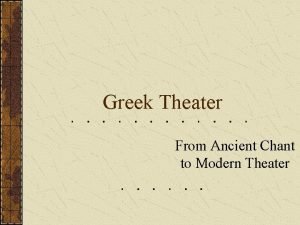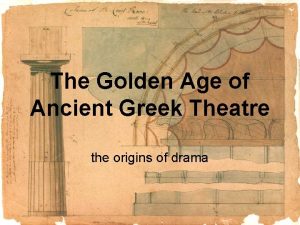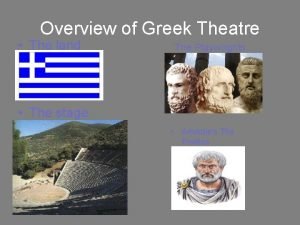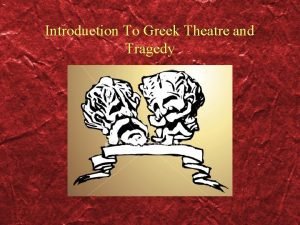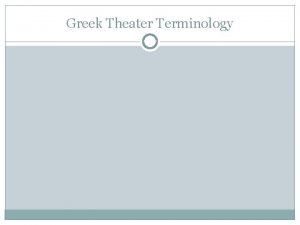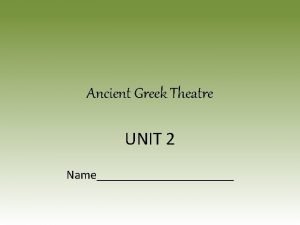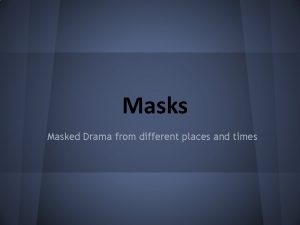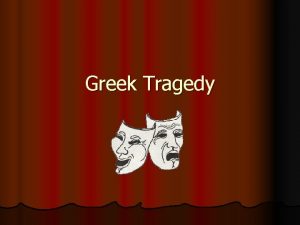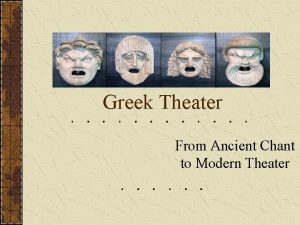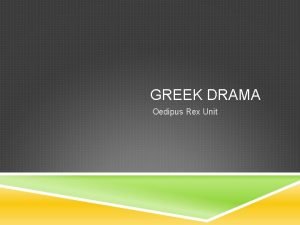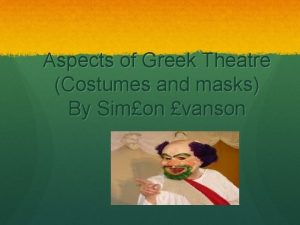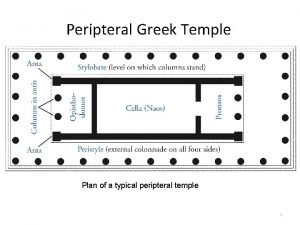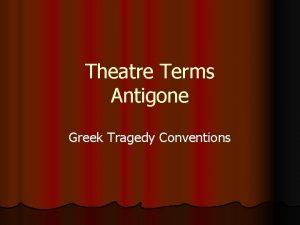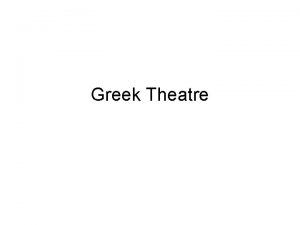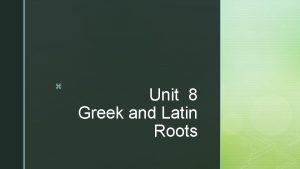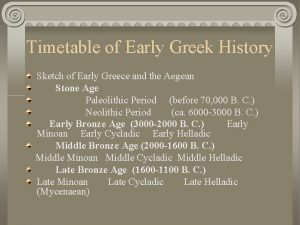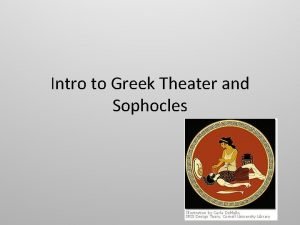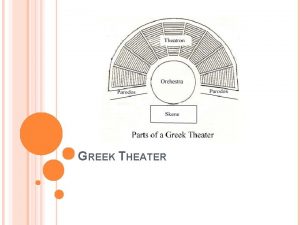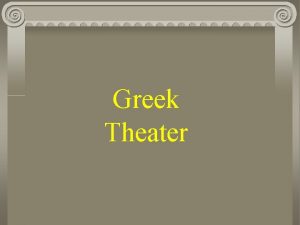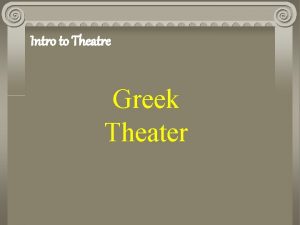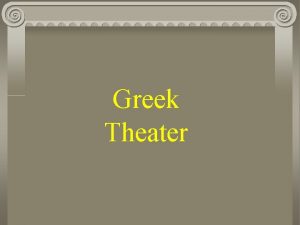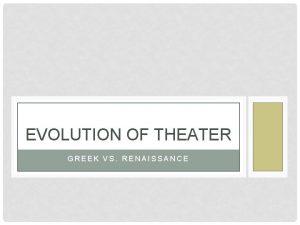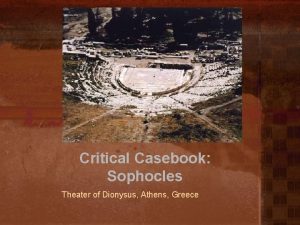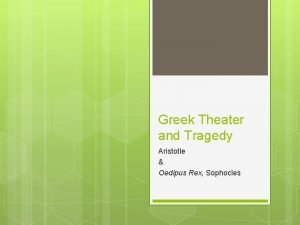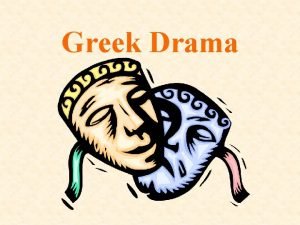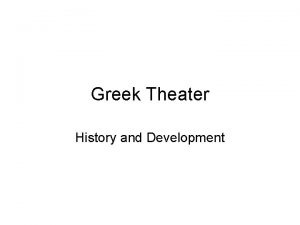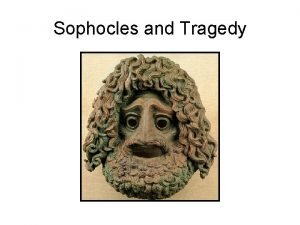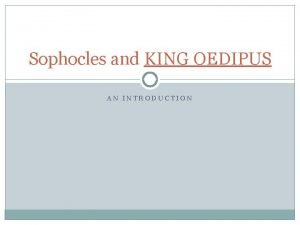Athens Sophocles and the Greek Theater Athens of






















- Slides: 22

Athens, Sophocles, and the Greek Theater

Athens of Classical Greece I. Brief Historic Overview A. Self-governing city-state (polis) B. During the 5 th Century B. C. , Athens was the richest and most advanced of all citystates C. Great wealth led to the support and promotion of arts and entertainment, especially the Festival of Dionysus, where Sophocles produced his tragedies

II. Importance and Emphasis of the Arts A. Public Unity The theatrical experience was an all encompassing public experience. Attending theater was social, political, and religious.

II. Importance and Emphasis of the Arts A. Public Unity (Cont’d) - Ancient Greek myth—the theme of most dramatic tragedies—touched the individual and drew the audience together, especially in times of hardship (famine).

II. Importance and Emphasis of the Arts B. Sacred Art Dramatic tradition began as choral performance celebrations to Dionysus (Roman god Bacchus), god of wine, pleasure, and fertility

II. Importance and Emphasis of the Arts C. Civic Duty - Because the Festival of Dionysus served as a ritual to honor the god, attending theater was a religious duty and responsibility of all pious citizens. So everyone went, men, women, & slaves

Sophocles (496 -406 B. C. ) Information about the Greek playwright Sophocles is vague and incomplete, there are some important details about his life. He is considered one of the most influential writers upon Western culture and one of the most tragic playwrights of all time. Sophocles lived during the Classical Period (500 to 400 B. C. ), a time of important transition for Greece, when political and cultural events were changing and shaping the Athenian culture.

Sophocles (496 -406 B. C. ) I. Early Years and Education C. Education Sophocles studied poetry, music, dancing, and gymnastics-all of which were considered to form a well-rounded education for citizens.

Sophocles (496 -406 B. C. ) II. Adult Years and Public Service A. Served as a diplomat, a general, and as a priest of Alscepius, a minor god of healing. B. In 443 B. C. , the great Athenian leader Pericles chose Sophocles to be treasurer of the Delian Confederation. C. Won first prize for dramatic writing at the Festival of Dionysus 18 times

Sophocles (496 -406 B. C. ) III. Contributions to Literature and Drama A. Wrote over 120 plays B. Credited for pioneering the use of on-stage scene paintings

Sophocles (496 -406 B. C. ) III. Contributions to Literature and Drama Added a third actor to the traditional pair; increased the Greek chorus from twelve to fifteen, and integrated chorus into the action.

Sophocles (496 -406 B. C. ) III. Contributions to Literature and Drama D. Aristotle, Greek philosopher, said, “The purpose of tragedy is to arouse pity and fear in the audience, and so create a catharsis, or cleansing of emotions —that will enlighten people about life and fate. ” Sophocles' entire Oedipus Trilogy achieves catharsis! E. Oedipus Rex (Oedipus the King) (430 B. C. ) is regarded as his masterpiece.

The Greek Theater I. History A. Began when writer Thespis separated one man from the chorus and gave individual lines to speak B. Thespis produced the first tragedy at the Festival of Dinoysus

A. Theater: Actors performed in an openair theater with audiences of up to 15, 000! The Greek Theater II. Performance http: //gigapan. org/gigapans/78096/ B. Staqe: Bare floor with wooden skene behind it

The Greek Theater II. Performance C. Costume: Actors wore long robes with masks that depicted their characters; they also often wore cothurni, platformed shoes, to give the illusion of great height when playing the parts of gods, goddesses, and mythical heroes.

The Greek Theater II. Performance D. Declamatory script: Because over-sized costumes made movement difficult, the script relied heavily upon the actor's dramatic delivery of lines, which is seen in lengthy monologues and stichomythic dialogue between two debating characters.

The Structure of the Greek Drama The Greek tragedy is divided into five distinct sections: 1. The Prologos (Prologue) - The opening portion of the play, which sets the scene and contains the exposition (introduces theme and main characters) 2. The Parados - The entrance song of the chorus, named after the broad aisles on either side of theater and in front of the orchestra along which the chorus entered or exited. 3. The Episodes (Scenes) The scenes in the action of the drama performed by the actors. The episodes alternate with and are distinguished from the stasimons, which are performed by the chorus.

The Structure of the Greek Drama 4. The Stasimons (Odes)- A choral passage (ode) alternating with the episodes of the plot. The odes (lyrical poems) use exalted and dignified language created for the choral passages. The chorus often sang and danced the tragic odes, accompanied by musical instruments (usually flute and harp). The tragic ode consisted of strophes and antistrophes, essentially stanzas of the poems. 5. Exodos (Epilogue) - The concluding section of the tragedy. The exodus ends with the chorus singing their final lines as they exit.

The Structure of the Greek Drama The Chorus The chorus of the Greek tragedy served several purposes: 1. Created odes, which contained music and dancing 2. Introduced and questioned new characters 3. Pointed out significant events 4. Established facts 5. Affirmed society's outlook and expressed societal attitude toward developments in the story 6. Covered passages of time between events 7. Separated the Scenes (Episodes)

Assignment… Review your notes for Tuesday, there will be questions in class for you to complete. Complete the following slide –Where am I Going. Write the entire slide out on a piece of paper filling in the blanks with your responses. Due Tuesday, September 11, 2018

I am from _______ (family tradition) and _______ (family trait), from _______ (name of family member) and _______ (another family name) and _______ (family name). I am from the _______ (description of family tendency) and _______ (another one). From _______ (something you were told as a child) and _______ (another). I am from (representation of religion, or lack of it). Further description. I'm from _______ (place of birth and family ancestry), _______ (two food items representing your family). From the _______ (specific family story about a specific person and detail), the _______ (another detail, and the _______ (another detail about another family member). I am from _______ (location of family pictures, mementos, archives and several more lines indicating their worth).

Where I’m Going Poem Template My quest is _____ (an accomplishment you hope to achieve) because I believe in _____ (name a value you hold). My dream is_____(name another hope you have) because I believe _t ___ (name another value). I wish for _____ I hope for _____ I am going to _____ (repeat one of the accomplishment you hope to achieve, or list a new one) because _____
 Greek theater vs modern theater
Greek theater vs modern theater Antigone overview
Antigone overview Prosternida
Prosternida Famous greek comic playwright
Famous greek comic playwright Stagecraft
Stagecraft Parts of ancient greek theater
Parts of ancient greek theater Greek theatre masks
Greek theatre masks Function of greek theater
Function of greek theater What type of play is a crude parody
What type of play is a crude parody Greek stage diagram
Greek stage diagram Ancient greek theater masks
Ancient greek theater masks Parados definition
Parados definition Ancient greek theater
Ancient greek theater Ancient greek masks
Ancient greek masks Roman theatre costumes
Roman theatre costumes Dying warrior from the west pediment
Dying warrior from the west pediment Conventions of greek theatre
Conventions of greek theatre Greek theater architecture
Greek theater architecture It is performed outdoors at festivals honoring the god
It is performed outdoors at festivals honoring the god Greek theater weather
Greek theater weather Greek theater has its roots in __________.
Greek theater has its roots in __________. Characteristics of greek theater
Characteristics of greek theater Ancient greek play masks
Ancient greek play masks
